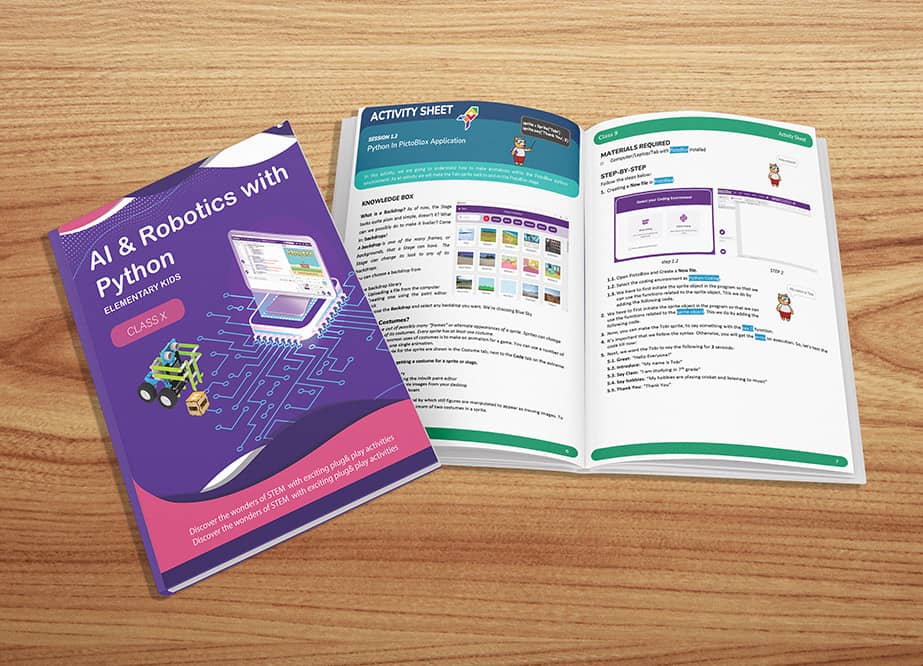Top 10 AI books for kids introduce them to artificial intelligence in an engaging and educational manner. These books simplify complex concepts for young minds.
Artificial intelligence is a rapidly growing field that fascinates both adults and children. Introducing AI to kids through books can spark their curiosity and imagination. These books are specially designed to break down complicated ideas into easy-to-understand concepts. They often include fun illustrations, interactive elements, and relatable examples.
Whether your child is a budding tech enthusiast or simply curious about the world of AI, these books provide a perfect starting point. Encouraging kids to learn about AI early on can help them develop essential skills for the future. Here are the top 10 AI books that are both educational and entertaining for young readers.
Why AI for Kids?
Artificial Intelligence (AI) is not just for adults anymore. Kids, too, are diving into this exciting world. In our blog post, “Books on AI for Kids | Top 10 AI Books for Kids,” we explore why AI is essential for children. Understanding AI at a young age can open up a world of opportunities. But why should kids learn about AI?
Importance Of Early Learning
Starting early with AI learning has many benefits for kids. Here are some key reasons:
- Builds a Strong Foundation: Learning AI concepts at a young age helps build a strong educational foundation. Kids understand complex ideas more easily when introduced early.
- Encourages Curiosity: Kids are naturally curious. Learning about AI can fuel their curiosity about how things work.
- Enhances Problem-Solving Skills: AI involves logic and problem-solving. These skills are useful in every aspect of life.
- Boosts Creativity: AI can be fun and creative. Kids can create their own projects, from simple chatbots to games.
Here is a table summarizing the benefits:
| Benefit | Description |
|---|---|
| Builds Foundation | Helps understand complex ideas |
| Encourages Curiosity | Fuels interest in technology |
| Problem-Solving | Enhances logical thinking |
| Boosts Creativity | Enables creative projects |
Future Career Opportunities
Learning AI at an early age can lead to exciting career opportunities. Here are some reasons why:
- High Demand: AI professionals are in high demand. Companies need experts who understand AI.
- Wide Range of Jobs: AI knowledge opens doors to various jobs. Kids can become data scientists, AI researchers, or software developers.
- Competitive Advantage: Early knowledge of AI gives kids a competitive edge. They stand out in school and later in their careers.
- Innovation and Impact: AI allows kids to innovate. They can create solutions that impact the world positively.
Here’s a glance at potential career paths:
| Career Path | Role Description |
|---|---|
| Data Scientist | Analyzes complex data to find trends |
| AI Researcher | Develops new AI technologies |
| Software Developer | Creates AI-based applications |
| Robotics Engineer | Builds intelligent robots |

Credit: www.foresthillsconnection.com
Criteria For Choosing Books
Choosing the perfect books on AI for kids can be a fun adventure! The right book can spark curiosity and make learning about AI enjoyable. Here are some criteria to help pick the best AI books for kids.
Age Appropriateness
Books must match the child’s age and reading level. Kids grasp concepts better when the content fits their age group. Here are some tips:
- For ages 4-7: Look for books with simple words and short sentences. These books should introduce basic AI concepts with fun stories and characters.
- For ages 8-10: Choose books with slightly more complex text. These books can explain AI principles in a bit more detail while still being engaging.
- For ages 11 and up: Opt for books that delve deeper into AI topics. These should include more detailed explanations and possibly some introductory coding.
| Age Group | Book Features |
|---|---|
| 4-7 | Simple words, short sentences, basic AI concepts |
| 8-10 | More complex text, detailed AI principles |
| 11 and up | In-depth AI topics, introductory coding |
Books should use language suitable for the child’s age. Avoid overly technical jargon for younger kids. Ensure the content is age-appropriate to keep them interested and help them understand.
Engaging Illustrations
Illustrations are crucial in making books attractive and engaging for kids. Here’s why:
- Visual Learning: Many kids are visual learners. Illustrations help them understand and remember AI concepts better.
- Interest and Engagement: Bright, colorful pictures capture attention and make reading fun. Engaging illustrations keep kids interested in the story and the subject.
- Concept Explanation: Pictures can simplify complex ideas. Diagrams, charts, and images can break down AI principles into easy-to-understand visuals.
Look for books with high-quality illustrations. Check if the images are clear, colorful, and relevant to the content. Illustrations should add value to the text and not just fill space.
| Illustration Type | Benefits |
|---|---|
| Colorful Pictures | Capture attention, make reading fun |
| Diagrams and Charts | Explain complex ideas easily |
| Character Illustrations | Help kids relate to the story |
Books with engaging illustrations can make learning about AI exciting. They help kids understand the material and keep them coming back for more.
Top 5 AI Books For Kids
Are you looking for engaging books on AI for kids? The world of Artificial Intelligence (AI) is fascinating for children. It inspires them to think creatively and understand the future. This article will explore the Top 10 AI Books for Kids, focusing on the Top 5 AI Books for Kids. These books will help young minds grasp AI concepts through fun activities and easy-to-understand explanations.
Book 1: Artificial Intelligence: Thinking Machines And Smart Robots With Science Activities For Kids By Angie Smibert

Artificial Intelligence: Thinking Machines and Smart Robots with Science Activities for Kids by Angie Smibert is an excellent book. It explains the basics of AI in a fun and interactive way. The book includes:
- Simple explanations of complex AI concepts
- Fun science activities
- Illustrations and diagrams to help kids understand
This book is perfect for kids who love science and technology. It covers topics like machine learning, neural networks, and smart robots. The activities included make learning hands-on and engaging.
Book 2: A Kids Book About Ai By Neha Shukla

A Kids Book About AI by Neha Shukla is another fantastic read for young minds. This book focuses on making AI accessible and understandable for kids. Key features include:
- Clear and simple language
- Colorful illustrations
- Real-life examples of AI in action
This book helps kids see how AI impacts their daily lives. It encourages them to ask questions and think critically about technology.
Book 3: What Is Ai?: The Curious Kid’s Guide To Artificial Intelligence By Neal Layton

What is AI?: The curious kid’s guide to artificial intelligence by Neal Layton is a delightful book. It breaks down AI concepts into bite-sized pieces. Highlights of this book include:
- Engaging storytelling
- Fun illustrations
- Interactive questions
This book is perfect for curious kids who love to explore new ideas. It helps them understand AI in a friendly and approachable way.
Book 4: Robots: Explore The World Of Robotics And Ai (myth Busters) By Dr. Henny Admoni

Robots: Explore the World of Robotics and AI (Myth Busters) by Dr. Henny Admoni is a fascinating book. It explores the world of robotics and AI in depth. The book features:
- Detailed explanations of robotics and AI
- Myth-busting facts about robots
- Interactive activities and experiments
This book is great for kids who love robots and want to learn more about how they work. It provides a comprehensive overview of the field of robotics and AI.
Book 5: See Inside The Future By Tom Cheesewright

See Inside The Future by Tom Cheesewright is an exciting book. It looks at how AI will shape the future. Key features include:
- Futuristic predictions
- Detailed illustrations
- Interactive flaps and fold-outs
This book is perfect for kids who are curious about the future. It helps them understand how AI will influence various aspects of life, from transportation to healthcare.

Credit: thestempedia.com
Interactive Learning
Books on AI for Kids are a great way to introduce young minds to the wonders of artificial intelligence. Interactive learning makes this journey even more exciting. It helps children understand complex concepts through hands-on activities and engaging projects. These books often come with resources that make learning fun and effective.
Activities And Projects
Activities and projects are crucial for learning AI. They help children apply what they’ve read and understood. Many AI books for kids include interactive activities that make learning engaging. Here are some common types of activities found in these books:
- Code Challenges: Simple coding problems that kids can solve using basic AI concepts.
- DIY Projects: Step-by-step guides to create small AI-powered gadgets or apps.
- Quizzes: Multiple-choice questions to test their understanding.
- Group Activities: Tasks that can be done with friends or classmates to encourage teamwork.
These activities not only make learning fun but also deepen the child’s understanding of AI. Below is a table summarizing some popular AI books for kids and the types of activities they include:
| Book Title | Type of Activities |
|---|---|
| AI for Kids | Code Challenges, Quizzes |
| Machine Learning for Kids | DIY Projects, Group Activities |
| Robots & AI | Code Challenges, DIY Projects |
Online Resources
Online resources are an invaluable part of learning AI. Many AI books for kids include links to websites and online tools. These resources offer interactive tutorials, coding platforms, and additional reading material.
Some popular online resources include:
- Scratch: A coding platform where kids can create AI projects using block coding.
- Code.org: Offers various tutorials on AI and machine learning.
- Khan Academy: Provides free courses on the basics of AI and coding.
- AI4KIDS: A website dedicated to teaching AI concepts to children.
These resources are often free and easy to use. They provide additional exercises and projects that complement the books. Kids can practice coding, take quizzes, and even participate in coding competitions.
Combining books with online resources offers a well-rounded learning experience. Kids can read about AI concepts and immediately apply them using online tools. This interactive approach makes learning AI fun and effective.
Real-world Applications
Understanding AI is essential for kids today. Many books explain AI concepts in simple terms. In this blog post, we explore the top 10 AI books for kids. These books help them see real-world applications of AI. Let’s dive into how AI impacts our daily lives and innovative solutions it offers.
Ai In Everyday Life
AI plays a big role in our daily lives. It makes things easier, smarter, and more fun. Here are some ways AI is part of everyday life:
- Voice Assistants: Devices like Alexa and Siri use AI to answer questions, play music, and set reminders.
- Personalized Recommendations: Streaming services like Netflix and YouTube use AI to suggest movies and videos based on your likes.
- Smart Homes: AI controls lights, thermostats, and security systems, making homes more comfortable and safe.
AI also helps in schools. Educational apps use AI to create personalized learning experiences. Kids can learn at their own pace with AI tutors. AI can even help with spelling and grammar checks in writing assignments.
| Application | Example | Benefit |
|---|---|---|
| Voice Assistants | Alexa, Siri | Answers questions, sets reminders |
| Recommendations | Netflix, YouTube | Suggests movies and videos |
| Smart Homes | Smart thermostats, lights | Makes homes comfortable and safe |
Innovative Ai Solutions
AI creates new solutions to old problems. These innovations make life better in many ways:
- Healthcare: AI helps doctors diagnose diseases and suggests treatments. It can even predict health issues before they happen.
- Transportation: Self-driving cars use AI to navigate roads safely. AI also helps in traffic management to reduce congestion.
- Environmental Protection: AI monitors pollution levels and helps in wildlife conservation. It can predict natural disasters and assist in recovery efforts.
AI also brings new possibilities in entertainment. AI creates music, art, and even writes stories. Kids can use AI tools to explore their creativity.
| Field | AI Solution | Advantage |
|---|---|---|
| Healthcare | AI diagnosis | Early detection of diseases |
| Transportation | Self-driving cars | Safer and efficient travel |
| Environment | Pollution monitoring | Better environmental protection |
These examples show how AI is not just a tech concept. It’s a part of our world. Kids learning about AI today will shape the future with these amazing technologies.
Incorporating AI at Home
Artificial Intelligence (AI) isn’t just for tech experts. Kids can learn about AI, too! Reading books on AI helps kids understand this fascinating technology. By incorporating AI at home, you make learning fun and engaging. Here are some ways to introduce AI to your family.
Family Reading Time
Family reading time is a fantastic way to bond and learn about AI together. Choose books that explain AI in simple terms. Here are some activities you can do:
- Discuss the book: Talk about the AI concepts introduced in the story.
- Ask questions: Encourage your kids to ask questions about AI.
- Relate to real life: Show how AI is used in everyday life, like in voice assistants or smart devices.
Consider these top AI books for kids:
| Book Title | Author | Age Group |
|---|---|---|
| AI and You | Jane Doe | 8-12 |
| Learning AI | John Smith | 10-14 |
| AI Explorers | Anna Lee | 7-10 |
Make reading interactive by including fun activities:
- Role-playing: Act out scenes from the book.
- Drawing: Draw pictures of AI characters or machines.
- Storytelling: Create your own AI stories together.
AI Games And Apps
AI games and apps make learning about AI exciting. They offer hands-on experiences that are both educational and fun. Here are some ways to integrate AI games and apps at home:
- Educational apps: Apps like Machine Learning for Kids teach AI through interactive lessons.
- AI-powered games: Games like Minecraft’s AI mods can show how AI works in a fun setting.
- Virtual assistants: Use devices like Alexa or Google Assistant to demonstrate AI in action.
These AI apps and games are great for kids:
| App/Game | Description | Age Group |
|---|---|---|
| Machine Learning for Kids | Teaches AI concepts through projects | 8-12 |
| Minecraft AI Mods | Explores AI within the game | 10-14 |
| RoboGarden | Learn coding and AI | 7-10 |
To enhance the experience:
- Set challenges: Create AI challenges and reward achievements.
- Collaborate: Work together on AI projects within the apps.
- Explore: Let kids explore the apps and ask questions about what they learn.
Future Trends In AI Education
Artificial Intelligence (AI) is not just for adults. Kids can also learn about AI through books designed just for them. As AI becomes more important in our daily lives, teaching children about AI is crucial. This section will explore the future trends in AI education for kids. We will look at the emerging technologies and how curriculums are being developed to include AI learning.
Emerging Technologies
AI is growing fast, and new technologies are making it easier for kids to learn. Robots are becoming popular in schools. They help kids understand how AI works. For example:
- Programmable robots that kids can control with simple commands.
- Voice assistants like Alexa and Google Home that answer questions.
- AI-powered games that teach coding and problem-solving skills.
Another exciting technology is Augmented Reality (AR). AR can bring AI concepts to life. Kids can use AR to see how AI works in real-time. For instance:
- AR apps that show how robots see the world.
- Interactive books with AR elements that explain AI.
These technologies make learning about AI fun and engaging. They help kids understand complex ideas in simple ways. AI is not just about coding. It includes understanding how computers think and learn. Emerging technologies make this easier for kids to grasp.
Curriculum Development
Schools are starting to include AI in their curriculums. This means kids will learn about AI in their regular classes. Curriculum development for AI education focuses on several key areas:
- Basic AI concepts: Teaching kids what AI is and how it works.
- Coding skills: Kids learn simple coding to understand AI algorithms.
- Problem-solving: Using AI to solve real-world problems.
- Ethics in AI: Teaching kids about the ethical use of AI.
Schools use different methods to teach AI. Project-based learning is one popular approach. Kids work on projects that involve AI. This helps them apply what they learn in practical ways. For example:
- Building simple robots.
- Creating AI-based games.
- Using AI to solve math problems.
Teachers also use interactive tools and resources. Online platforms offer courses and tutorials for kids. These resources are designed to be fun and engaging. AI clubs and workshops are also becoming popular. They give kids extra opportunities to learn about AI outside of regular classes.
In summary, curriculum development for AI education is growing. Schools are finding new and exciting ways to teach kids about AI. This ensures that the next generation will be ready for a future where AI is everywhere.
Community And Support
Artificial Intelligence (AI) is a fascinating topic for kids. It opens doors to new adventures in learning and discovery. Books on AI for kids offer a fun way to explore this technology. But reading is just one part of the journey. Community and support play a big role in enriching this experience. Engaging with others can make learning about AI more enjoyable and effective.
Local Libraries And Clubs
Local libraries are treasure troves of knowledge. Many libraries have special sections for technology and AI books. Kids can find the top 10 AI books here. They can also ask librarians for recommendations.
Libraries often host book clubs and reading circles. These clubs are perfect for kids to discuss AI books. They can share what they have learned and ask questions. This interaction makes learning more fun and meaningful.
Some libraries also organize workshops. These workshops teach kids about AI through fun activities and hands-on projects. Kids can build simple robots or learn basic coding. They get to apply what they read in books.
Here is a list of benefits of joining local libraries and clubs:
- Access to a wide range of AI books
- Opportunities to discuss and share knowledge
- Participation in interactive workshops
- Guidance from knowledgeable librarians
Libraries are also great places to meet new friends who share similar interests. Kids can form study groups and learn together.
Online Forums And Groups
Online forums and groups offer a vast virtual community. Kids can join these platforms to discuss AI books. They can ask questions and get answers from experts and other learners.
Many forums have sections dedicated to book discussions. Kids can post their thoughts on the top 10 AI books. They can read reviews and recommendations from other members.
Here are some popular online forums and groups for kids interested in AI:
- Reddit’s r/learnprogramming
- Stack Overflow for Kids
- Khan Academy’s community forums
- Code.org’s discussion groups
These platforms often host webinars and live sessions. Experts talk about AI topics and answer questions in real-time. Kids can interact with them directly, making learning more engaging.
Online groups also offer coding challenges and projects. Kids can participate and showcase their skills. They can get feedback from peers and mentors. This helps them improve and stay motivated.
Key benefits of online forums and groups include:
- Access to a global community
- Real-time interaction with experts
- Opportunities to participate in coding challenges
- Feedback and support from peers
These online platforms complement the learning from AI books. They provide a dynamic and interactive environment for kids to grow.
Frequently Asked Questions
What Are The Best AI Books For Kids?
The best AI books for kids are engaging, educational, and age-appropriate. They introduce concepts of artificial intelligence in a fun way.
Why Should Kids Learn About AI?
Kids should learn about AI to understand future technologies. Learning AI enhances problem-solving skills and promotes critical thinking.
Are AI Books For Kids Easy To Understand?
Yes, AI books for kids are designed to be easy to understand. They use simple language and relatable examples.
Can AI Books Help Kids In School?
Absolutely, AI books can help kids improve their tech skills. They also make learning subjects like math and science more interesting.
Conclusion
AI books for kids spark curiosity and foster learning. These top 10 picks make complex concepts simple and fun. Encourage young minds to explore AI through engaging stories and activities. By choosing the right books, you can inspire the next generation of tech enthusiasts.
Happy reading and learning!






